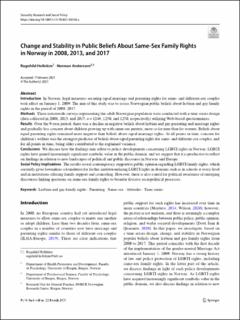Change and Stability in Public Beliefs About Same‑Sex Family Rights in Norway in 2008, 2013, and 2017
Journal article, Peer reviewed
Published version

Åpne
Permanent lenke
https://hdl.handle.net/11250/2831811Utgivelsesdato
2021Metadata
Vis full innførselSamlinger
Sammendrag
Introduction
In Norway, legal measures securing equal marriage and parenting rights for same- and different-sex couples took effect on January 1, 2009. The aim of this study was to assess Norwegian public beliefs about lesbian and gay family rights in the period of 2008–2017.
Methods
Three nationwide surveys representing the adult Norwegian population were conducted with a time series design (data collected in 2008, 2013, and 2017, n = 1246, 1250, and 1250, respectively) utilizing Web-based questionnaires.
Results
Over the 9-year period, there was a decline in negative beliefs about lesbian and gay parenting and marriage rights and gradually less concern about children growing up with same-sex parents, more so for men than for women. Beliefs about equal parenting rights remained more negative than beliefs about equal marriage rights. At all points in time, concern for children’s welfare was the strongest predictor of beliefs about equal parenting rights for same- and different-sex couples, and for all points in time, being older contributed to the explained variance.
Conclusions
We discuss how the findings may relate to policy developments concerning LGBTI rights in Norway. LGBTI rights have gained increasingly significant symbolic value in the public domain, and we suggest that it is productive to reflect on findings in relation to new landscapes of political and public discourse in Norway and Europe.
Social Policy Implications
The results reveal contemporary supportive public opinion regarding LGBTI family rights, which currently gives lawmakers a foundation for further institutionalizing LGBTI rights in domains such as in schools at every level and in institutions offering family support and counseling. However, there is also a need for political awareness of emerging discourses linking questions on same-sex family rights to broader divisive sociopolitical processes.
